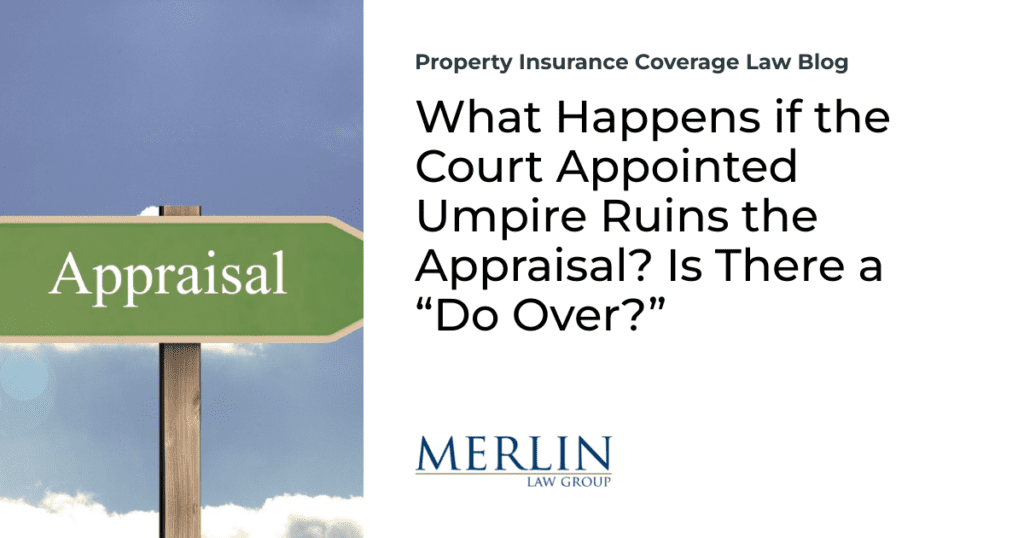What Happens if the Court Appointed Umpire Ruins the Appraisal? Is There a “Do Over?”

How many policyholders, public adjusters, and appraisers become concerned when the judge picks an umpire who does not seem to have much experience with property insurance or the appraisal process? One reason I suggest that “all parties involved in an appraisal should try very hard to put their heads together to agree on someone they both think will be fair,” as noted in How Do Judges Appoint Umpires in an Appraisal? A Case Example from Louisiana, is that an inexperienced umpire can ruin the appraisal and cause further delays for everybody.
So, what happens if the trial judge who appointed the umpire finds that the umpire ruined an appraisal? Can the judge order a “do over?” This was the situation recently addressed in New York.1
The insurance company argued that:
The court-ordered umpire issued an appraisal award that was fatally flawed as it awarded the petitioners-appellants an ‘actual cash value projected repair cost’ in the amount of $612,982.18. The umpire stated that the award was not subject to depreciation because ‘there was no betterment to the building,’ it did not account for the policy deductible, and it was not subject to deduction for NYCM’s previous actual-cash-value payments that totaled $370,700.52….
…
ignored and/or disregarded: (1) the petitioners-appellants’ demand for appraisal of the RCV and ACV of the subject property’s dwelling; (2) the Order; (3) the subject policy; and (4) the insurance industry standards for the appraisal process. Thus, the Court denied the petitioners-appellants’ petition to confirm the first appraisal award in its entirety and Mr. Cohen was required to correct his misconduct.
One appraisal standard that most will completely disagree with the insurer is the issue of the appraisal panel making any calculations for deductibles and prior payments. While prior payments may be evidence the panel would want to know about and consider, the panel is supposed to state the “amount of the loss” and not “the amount of loss less prior payments” nor “the amount of the loss less the deductible.”
The policyholder took the following position:
[T]he parties engaged in an insurance appraisal, as codified in Insurance Law § 3404(e) and as further provided for in the insurance policy entered into between the Insureds and the Carrier (the ‘Policy’). During that initial appraisal, the Insureds believed the appraisal award was acceptable based on (i) their reading of the appraisal award and (ii) their independent appraiser’s confirmation with the umpire as to the meaning of the appraisal award.
As such, the Insureds’ petitioned the trial court to confirm the appraisal award. The Carrier opposed the motion to confirm and argued the award should be set aside due to alleged misconduct by the umpire (who was previously appointed by the trial court, pursuant to Insurance Law § 3408). The only motion in front of the trial court was Petitioner’s motion to confirm.
By Order entered August 23, 2022 (the ‘Order’), the Hon. Raymond W. Walter, J.S.C., Ordered ‘that the appraisal award is set aside, and that the appraisal is remanded to Mr. Cohen [the umpire] and the appraisers (Victor Battey and Marc Palumbo) for further deliberations consistent with the policy requirements.’
In other words, the Court disregarded that the only motion in front of it was the motion to confirm the appraisal award. Instead, despite finding sufficient grounds to set aside the appraisal award as defective and invalid, the trial court Ordered the parties to engage in further appraisal proceedings for a proverbial ‘do over.’ This was in error.
Accordingly, this appeal involves a single, simple question for the Court to decide: where the trial court found sufficient grounds existed to set aside an insurance appraisal award – through no fault of the Insureds – are the Insureds required to re-submit their claim to another appraisal?
The appellate court ruled in favor of the policyholder’s argument and ruled that the judge could not send the appraisal back to the panel for a “do over.”
On the merits, we agree with petitioners that the court erred in remitting the appraisal to the umpire and appraisers for further deliberations. It is well settled that “after an appraisal proceeding has terminated in an award and the award has been set aside, without any fault on the part of the insured[s], [they] need not submit to any further appraisement but may sue on the policy…Here, it is undisputed that the court set aside the appraisal award due to errors made by the court-appointed umpire—i.e., not due to any fault of petitioners. Consequently, the court could not properly compel petitioners to participate in further appraisal proceedings …Indeed, we note that petitioners are now entitled to pursue a plenary action in Supreme Court seeking full recovery on their insurance claim under the policy…. We therefore modify the order by vacating that part of the first ordering paragraph remitting the matter to the umpire and appraisers.2
Readers should note that this involves New York law, and a “do over” may be required in another jurisdiction.
My suggestion is that many of these problems can be avoided by the appointment of umpires who have credentials and experience. The IAUA, PLAN, and Windstorm Insurance Network offer certifications for umpires. One of the basic lessons in those classes involves the appraisal award form.
Thought For The Day
An investment in knowledge pays the best interest.
Benjamin Franklin
1 Stanz v. New York Central Mut. Fire Ins. Co., — N.Y.S.3d —-, 2023 N.Y. Slip Op. 05832 (N.Y. Sup.Ct. – App. Div. Nov. 17, 2023).
2 Id.



